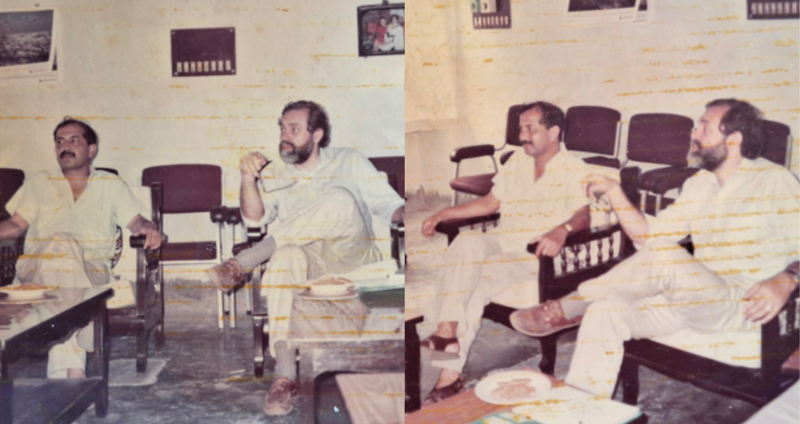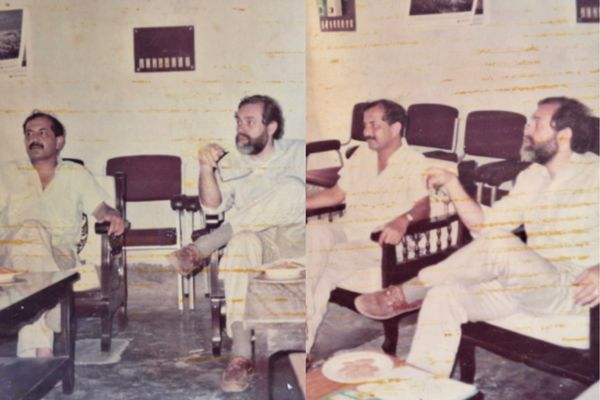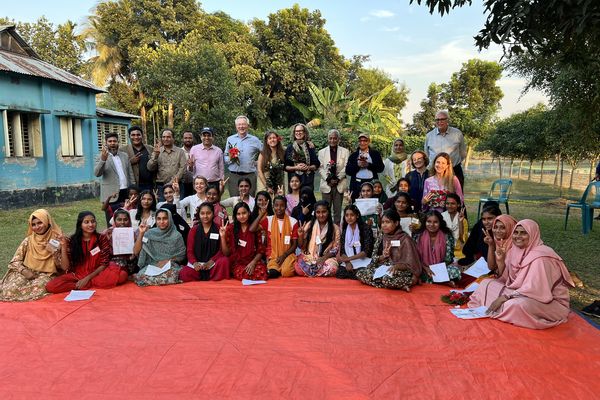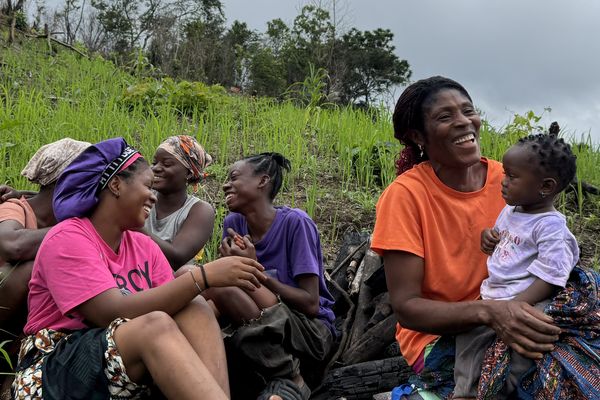
This piece was originally published in The Business Standard. It has been reposted below.
Pictured above: Mushtaque Chowdhury, left, and Richard Cash, right, chat among collaborators and peers on the Oral Rehydration Therapy program in Bangladesh. Photo courtesy of Mushtaque Chowdhury.
Richard Alan Cash, a senior faculty of the Harvard School of Public Health has just passed away in Boston, USA. He and I have been friends for over four decades and have worked together in Bangladesh and many other parts of the world. I was fortunate to co-author with him many books and articles on global development, particularly those related to public health. Richard had an eternal tie with Bangladesh. In him we lost a selfless ambassador. In 1971, he mobilized international support and advocated for US support for our independence. As a recognition of his contributions, he was given the ‘Friends of Liberation War’ medal by the Bangladesh government. I felt deeply honored when I received the award on his behalf from the then Prime Minister.
Richard was born in 1941 in the state of Wisconsin, USA where he had his early education. He studied medicine at the New York University School of Medicine and completed a higher degree in public health from Johns Hopkins University. His first assignment as a doctor was in Dhaka where he worked as a medical officer at the Cholera Research Laboratory (now icddrb) in 1966-69. His Dhaka assignment was monumental in pursuing his own excellence and contributing to the world of medical science. Working closely with David Nalin, Majid Molla, Rafiqul Islam and others, he carried out multiple research studies both in Dhaka and Matlab, Bangladesh in the late 1960s that led to the perfection of oral rehydration therapy (ORT) as the treatment of choice for diarrheal dehydration. The discovery of ORT had a tremendous impact on child survival globally. The Lancet, the prestigious medical journal, called it the ‘most significant medical advance of the century.’ Although its background work was carried out in Bangladesh, the fruits of ORT were not made available to the common citizens until BRAC took on the onerous task of teaching every mother in the country on how to prepare ORT at home with salt and sugar – or lobon-gur solution (using the Bengali words for salt and jaggery, a sweet unrefined sugar that is traditional in South Asia). Because of this daunting work and the subsequent marketing of the solution by various agencies and companies, Bangladesh now has the highest use rate of ORT in the world – over 80% of diarrhea episodes are now treated with some forms of ORT! Richard and his colleagues will be remembered for saving millions of lives every year around the world through the use of the magic solution. As a recognition of this contribution, he received many awards including the prestigious Prince Mahidol Award in Thailand in 2006.
I first met Richard in late 1979. He was conducting a course at icddrb. I just had returned after completing my master’s in demography at the London School of Economics. At that time, BRAC had started a pilot program to develop a model for teaching ORT at household level. We at BRAC decided to expose him to the pilot project in Habiganj, Bangladesh and solicit his advice on going forward. Abed bhai (BRAC’s founder, Sir Fazle Hasan Abed) asked me to accompany Richard. For me, it was a golden opportunity to meet and get acquainted with a Harvard professor, a kind of a dream for a young professional. We spent three days in the field together visiting different villages. He was impressed with both the way the project was being implemented and my own engagement with it in improving the delivery of the intervention. Afterwards, we became good friends and remained so until his last days. The last time I met him was in June of this year when I visited him with Sadia Chowdhury, formerly of BRAC and the World Bank, in his rehab center in Boston. He was so happy to see us and we reminisced upon many memories of us together. We were not surprised to see the Dean of the Harvard School of Public Health in her visit feeding soup to Richard as a show of care and respect for her senior faculty.
Richard was a great friend of BRAC and of its founder Sir Abed. When we decided to launch a school of public health at Brac University, he was there to help us take it forward. I remember our preparatory trip to Hanoi to study how their school of public health was practicing ‘problem-based learning,’ which we wanted to imitate. Hanoi was one of the few schools of public health in the world where the Rockefeller Foundation’s ‘schools of public health without walls’ model was being tested. We learned how the concept was being implemented in the Vietnamese context, and the challenges it was facing. We came up with the conclusion that we needed to do much more in getting the community involved in the teaching than the Hanoi experience was able to do. Such learning helped the James P. Grant School of Public Health develop as an effective model practicing community-based, problem-based learning. We couldn’t perhaps do it without Richard and several of our other friends. Until his last day, Richard was an adjunct professor teaching at least two courses including the Epidemiology of Infectious Diseases. He was one of the most popular and successful teachers in our School. Everyone at the School is in shock after learning of his passing.
In my year at Harvard in the early nineties as a MacArthur fellow, Richard was a daily friend for me and my family. He used to invite us frequently for a meal or for a trip to a tourist spot. He would also visit us when I was doing my doctoral work in London in mid-1980s. We have saved a picture where he was holding my son Wameq in his lap, trying to teach him the alphabet. While at Harvard, Richard and I started writing the book, “A Simple Solution” (published by University Press in 1996), which documented the decade-long experience of BRAC’s ORT program. The book, which has been reprinted several times, has earned worldwide attention and appreciation, and is taught in many universities globally. I have had the good fortune to co-author with Richard numerous articles and books. He was a great copy editor, too. I would send many of my writings for him to edit, which he always did with deep interest.
Richard was a great support throughout my professional career. In the 1980s, he was the Director of a large USAID-funded project titled Applied Diarrheal Disease Research, based at Harvard. Through this project, academics in low-income countries received grants to do research on practical aspects related to diarrheal diseases. Richard asked me to oversee one such research project that was awarded to a group of academics at Thailand’s Khon Kaen University. I spent several days at Khon Kaen working with the researchers on its implementation. We worked collegially, and the researchers were very happy. They wrote to Richard commending me and my assistance. This made Richard very happy, too. He would mention this story many times to many people as an example of South-to-South learning.
One of Richard’s unfulfilled desires was to read my memoir. As it was in Bangla, he wanted me to translate it. I feel bad that the English version couldn’t be completed before he left us forever. Richard has left us, and I feel a great void around me. My heartfelt sympathy goes out to his lovely wife Stella Dupuis, his sisters Kathy and Ellen, and to his numerous friends and well-wishers who are spread all over the world, and who, I am sure, are equally saddened. The world has lost a great human being; it will never be the same again. May his soul rest in eternal peace.
Read the tribute on The Business Standard.
Mushtaque Chowdhury is a Clinical Professor of Population and Family Health at Mailman School of Public Health, Columbia University, New York. He was formerly Vice Chair at BRAC, and Founding Dean at the James P. Grant School of Public Health, Brac University.
Make a gift to honor Richard Cash’s legacy
Richard’s family wishes for gifts made in his honor to be made to BRAC in support of it’s Ultra-Poor Graduation program. Make a gift in his honor here.



